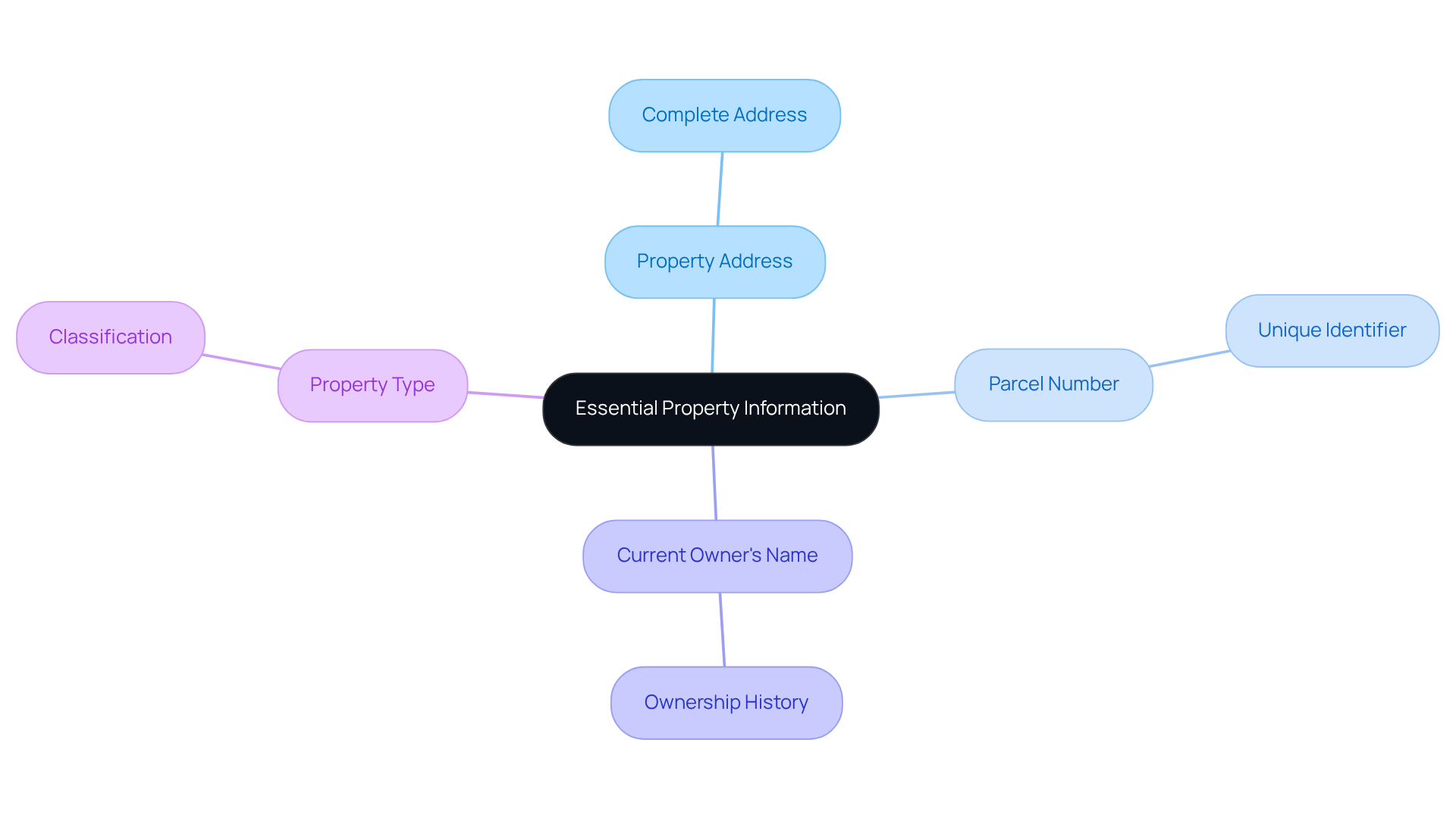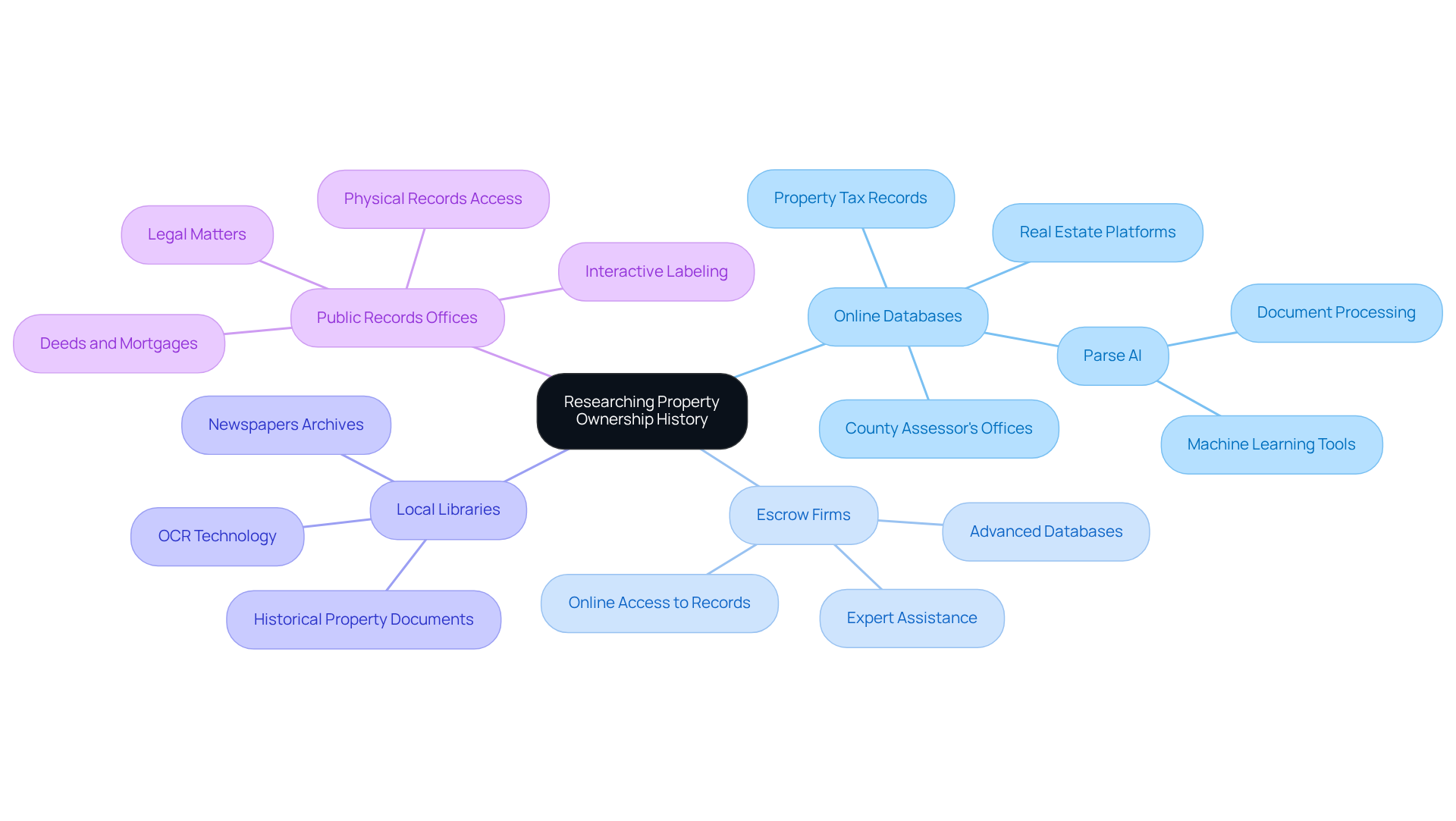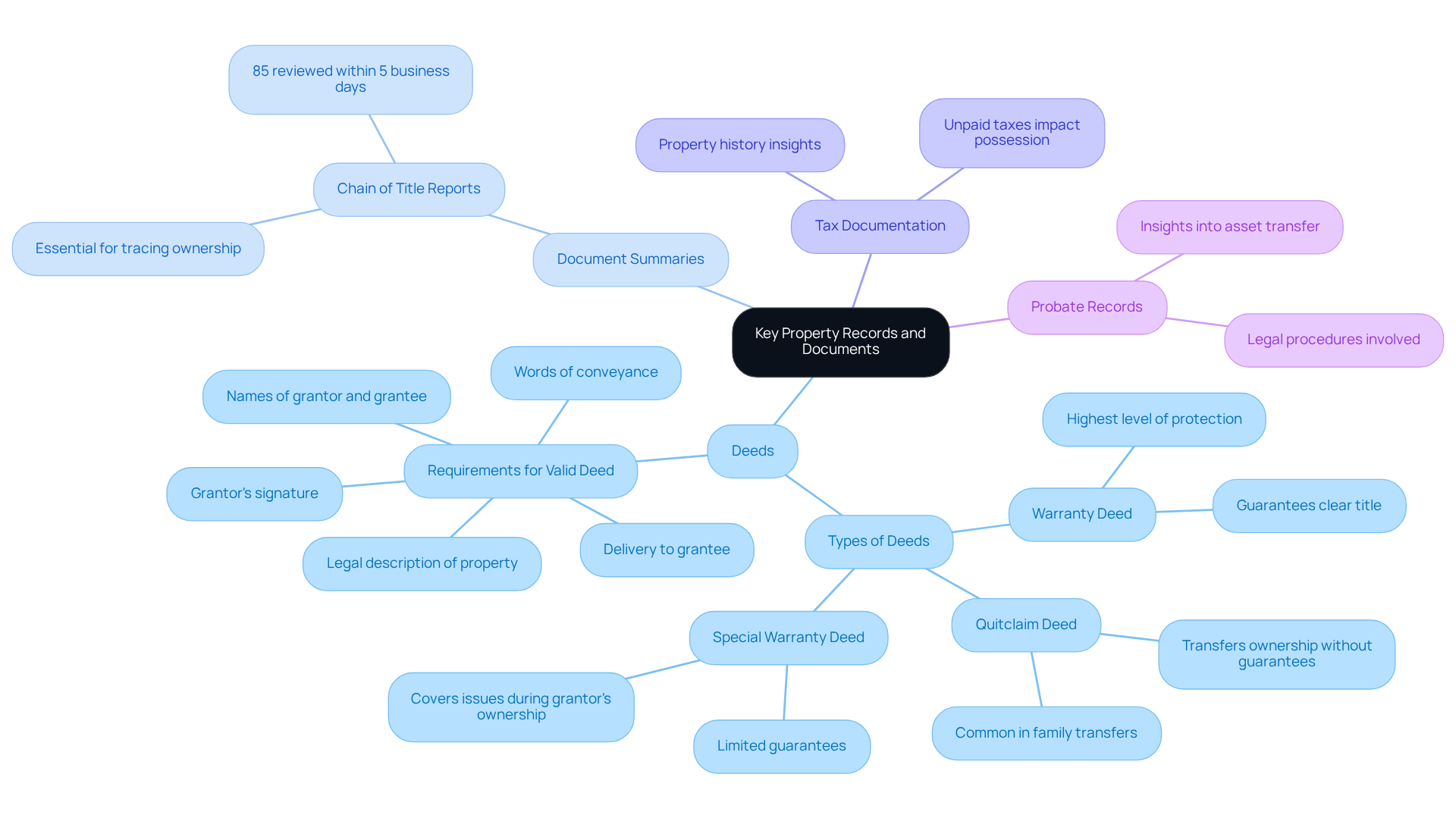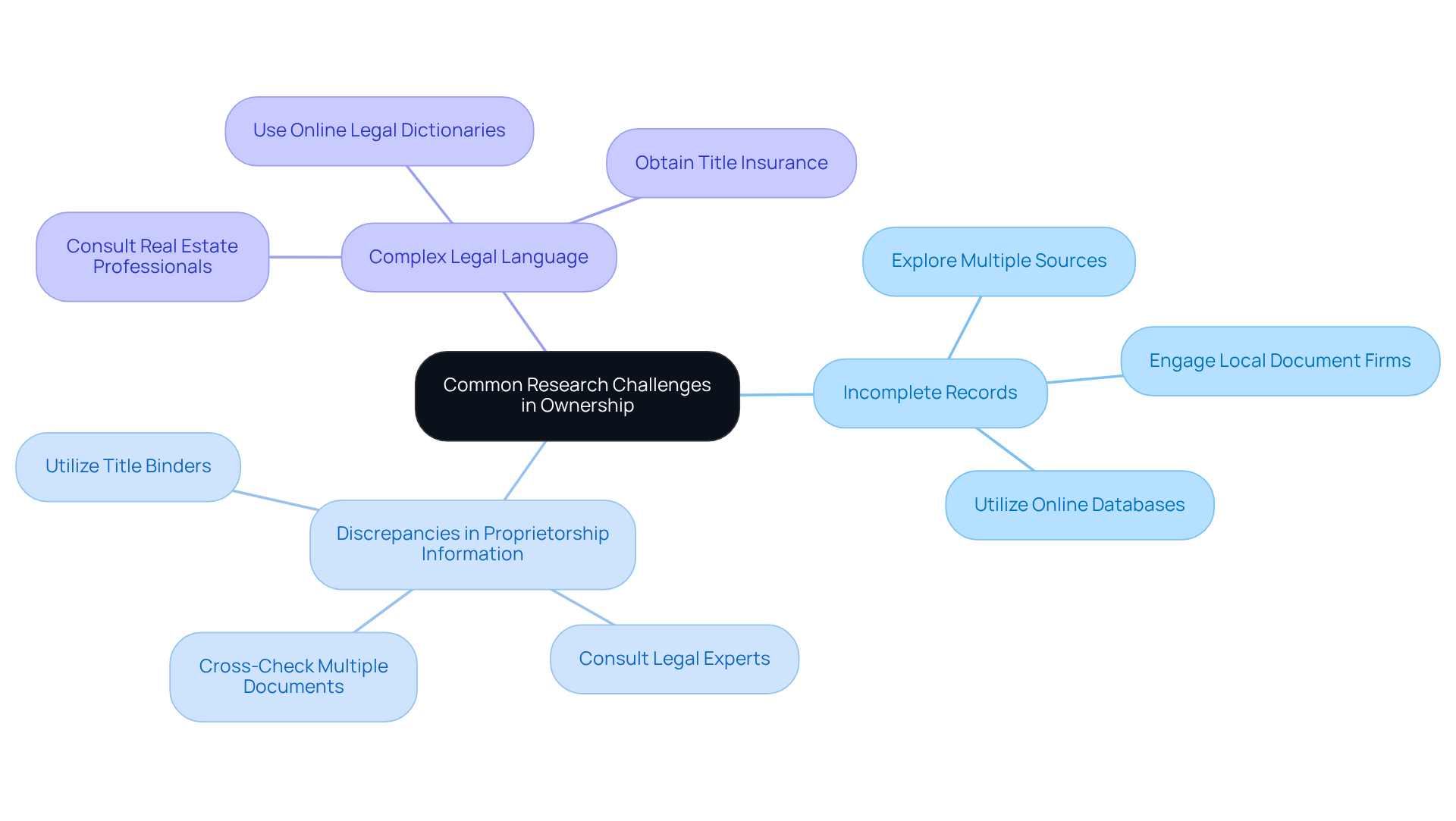Overview
To find past owners of a property, it is essential to gather key property information, including:
- The property address
- Parcel number
- Current owner's name
Subsequently, one must utilize both online and offline research tools, such as:
- Public records
- Local libraries
This process underscores the importance of thorough data collection and leveraging diverse resources. Furthermore, online databases and expert assistance play a crucial role in effectively tracing ownership history and resolving potential discrepancies in property records.
Introduction
Understanding the history of a property is as crucial as the investment itself; yet, many individuals overlook the importance of thorough title research. This guide delves into the essential steps for uncovering past owners of a property, equipping readers with the tools and knowledge necessary to navigate the complexities of ownership records. However, challenges such as incomplete documents and legal jargon lurk at every turn. Consequently, how can one ensure a comprehensive and accurate title search?
Gather Essential Property Information
To commence your effectively, it is crucial to gather comprehensive details about the asset in question. This foundational data encompasses:
- Property Address: Ensure you have the complete address, including the street number, street name, city, and zip code. A precise address is vital, serving as the primary reference point for all subsequent searches.
- Parcel Number: If available, this , enabling faster access to and assisting in preventing confusion with similarly named locations.
- : Knowing the current owner's name is crucial for understanding how to , as it helps trace back through the and provides a clearer picture of the asset's past.
- Property Type: Identify whether the property is residential, commercial, or agricultural. This classification influences the types of records you will need to access and the specific regulations that may apply.
Collecting this crucial information establishes a strong foundation for your research and enhances the precision and effectiveness of the search process. As highlighted by industry specialists, "A is essential to facilitating a seamless transfer of real estate rights." This underscores the importance of meticulous data collection, particularly in a market where , climbing from $144,464 to $381,922 over the past decade—a remarkable 164% increase. By confirming location addresses and parcel identifiers, you can mitigate risks associated with ambiguous deeds or contracts, which frequently lead to disputes over rights.

Utilize Online and Offline Research Tools
To learn , it is essential to leverage a blend of online and offline research tools, enhanced by .
Online Databases: Utilize resources such as county assessor's offices, property tax records, and real estate platforms, which are vital for accessing valuable ownership histories. Approximately 70% of title companies now offer online access to property documents, streamlining the research process. Furthermore, access to over 81 billion public documents can assist in revealing hard-to-find connections, thereby improving your research capabilities. With Parse AI's , you can automate the extraction of , making the process even more efficient.
Escrow Firms: Numerous escrow firms provide not only online access to property records but also expert assistance in navigating complex ownership histories. Engaging with these companies can significantly , as they often . It is important to note that document searches typically cost between $150 and $1,000, depending on the depth of the report and state regulations. By integrating Parse AI's document processing capabilities, title researchers can enhance their ability to understand how to find past owners of a property and complete abstracts and reports faster and more accurately.
Local Libraries: Libraries often preserve archives of historical property documents and newspapers, which can provide insights into previous possession and property transactions. Utilizing Parse AI's OCR technology can aid in digitizing and analyzing these documents, making them more accessible for research.
Public Records Offices: Visiting local government offices allows for access to physical records, including deeds and mortgages, which are essential for confirming property history. Be aware that performing a property search can uncover potential legal matters, such as unpaid contractor fees or outstanding loans, which should be resolved before completing any transactions. Parse AI's interactive labeling feature can assist in organizing and extracting relevant data from these documents, ensuring a thorough review.
As Matthew Carter pointed out, "a title search reveals not only the history of the title but all past and present liens associated with the asset." By utilizing a blend of these resources and harnessing the capabilities of Parse AI, you can build a comprehensive understanding of a real estate asset's history, ensuring informed decision-making in transactions.

Identify Key Property Records and Documents
When conducting , it is essential to understand how to find past owners of a property by identifying key records and documents that provide insights into .
- Deeds: These legal documents serve as the most direct evidence of ownership transfer, making them a primary focus in your research. A valid deed must contain the names of the grantor and grantee, a , include words of conveyance, be signed by the grantor, and be delivered to the grantee. Grasping the —like warranty deeds, quitclaim deeds, and special warranty deeds—is essential, as each provides different degrees of protection and consequences for possession. For example, a warranty deed ensures that the real estate is free from any claims or liens, whereas a quitclaim deed conveys ownership rights without assurances regarding the condition of the asset.
- Document Summaries: A document summary outlines the asset's ownership history, detailing previous owners and any liens or encumbrances. often review an average of 85% of Chain of Title Reports within five business days, as reported by AFX, highlighting the efficiency of modern title research methods. These abstracts are essential for tracing lineage and ensuring clarity in real estate transactions.
- Tax Documentation: These documents can disclose and any unpaid taxes that may influence possession. They are frequently utilized alongside deeds and abstracts to offer a thorough perspective on real estate status.
- Probate Records: If a previous owner has died, probate records can illuminate how the asset was transferred, providing insights into the legal procedures involved in the transfer of title.
By pinpointing these documents, you can effectively understand how to find past owners of a property, ensuring a thorough understanding of its history and any potential issues that may arise.

Troubleshoot Common Research Challenges
Conducting ownership research often presents several challenges that can hinder progress. Addressing these common issues effectively is crucial for success:
- : Missing records can significantly impede your research efforts. To mitigate this, explore multiple sources, including county offices and online databases. Engaging with local document firms can also provide valuable insights and assist in locating elusive records. Statistics indicate that over one-third of property researchers encounter incomplete documents, while real estate firms report that more than one-third of transactions require extraordinary effort to resolve . This underscores the importance of thoroughness in your investigation.
- : Inconsistencies in proprietorship details may arise from various sources, such as outdated documents or clerical errors. To rectify these discrepancies, cross-check several documents, including deeds, tax files, and ownership commitments. Legal experts emphasize that a comprehensive examination of these documents is essential for establishing clear possession. A case study titled "The Significance of Title Binders in Resolving Ownership Conflicts" illustrates how utilizing such binders can effectively clarify ownership inconsistencies, leading to successful conflict resolution and restoring trust in asset documentation.
- : Title documents frequently contain intricate legal terminology that can pose interpretative challenges. When confronted with difficult legal terms, consider specializing in real estate or utilizing online legal dictionaries for clarification. This proactive approach not only aids in understanding but also ensures informed decision-making based on accurate interpretations of the law. Furthermore, obtaining an insurance policy for property can protect against unforeseen ownership issues that may arise post-closing, further safeguarding your interests.
By confronting these challenges directly, you can significantly enhance the efficiency and accuracy of your , ultimately leading to more successful outcomes in .

Conclusion
Gathering the history of property ownership is a critical process for anyone involved in real estate transactions. Understanding how to find past owners of a property involves meticulous research and the use of various resources, both online and offline. By systematically collecting essential property information, utilizing advanced research tools, and identifying key documents, individuals can navigate the complexities of title research more effectively, ensuring a comprehensive understanding of the property’s ownership lineage.
The article highlights several key steps in this research process. It emphasizes the importance of:
- Gathering accurate property details
- Leveraging online databases and local resources
- Identifying crucial records like deeds and tax documentation
Furthermore, it addresses common challenges such as incomplete records and discrepancies in ownership information, providing strategies to overcome these obstacles. The integration of modern technologies, such as those offered by Parse AI, can further streamline and enhance the research experience, making it easier to uncover vital ownership history.
Ultimately, thorough title research is not just a procedural task; it is essential for safeguarding investments and ensuring clear ownership rights. By taking the time to explore all available resources and addressing potential challenges head-on, individuals can make informed decisions that protect their interests and facilitate smooth property transactions. Embracing these practices will not only enhance the effectiveness of title research but also contribute to a more transparent real estate market.
Frequently Asked Questions
What essential property information should be gathered for title research?
The essential property information includes the complete property address, parcel number, current owner's name, and property type (residential, commercial, or agricultural).
Why is the complete property address important?
The complete property address serves as the primary reference point for all subsequent searches, ensuring accuracy in the title research process.
How does a parcel number assist in the title research process?
A parcel number is a unique identifier that can streamline the search process, enabling faster access to real estate records and helping to prevent confusion with similarly named locations.
Why is knowing the current owner's name significant?
Knowing the current owner's name is crucial for tracing back through the ownership history of a property, which provides a clearer picture of the asset's past.
How does the property type affect the title research?
The property type influences the types of records that need to be accessed and the specific regulations that may apply to the property.
What is the importance of conducting a comprehensive title search?
A comprehensive title search is essential for facilitating a seamless transfer of real estate rights and helps mitigate risks associated with ambiguous deeds or contracts, which can lead to disputes over rights.




